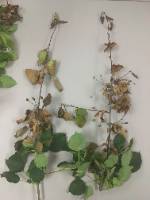Fireblight
 This pathogen impacts the Rosacea family of ornamental trees and shrubs. While it is not native to the US, it was first reported in New York in the 1700s and is prevalent across the United States. Fireblight is most common on apple, crabapple, pear, cotoneaster, quince, serviceberry, and many other trees and shrubs. Infection by the pathogen typically occurs in the spring when the pathogen infects the flowers, and the disease spreads into the shoot and the leaves of the impacted branch. The infected leaves and shoots turn dark brown or black, and the shoot tip starts to curl downward into a characteristic “shepherd's crook” as seen in the photo. The disease can also cause cankers on the trunk and larger branches. The bark on the cankered stem is dark, may be sunken or cracked, and when the disease is active, there may be a bacterial ooze emitting from the area.
This pathogen impacts the Rosacea family of ornamental trees and shrubs. While it is not native to the US, it was first reported in New York in the 1700s and is prevalent across the United States. Fireblight is most common on apple, crabapple, pear, cotoneaster, quince, serviceberry, and many other trees and shrubs. Infection by the pathogen typically occurs in the spring when the pathogen infects the flowers, and the disease spreads into the shoot and the leaves of the impacted branch. The infected leaves and shoots turn dark brown or black, and the shoot tip starts to curl downward into a characteristic “shepherd's crook” as seen in the photo. The disease can also cause cankers on the trunk and larger branches. The bark on the cankered stem is dark, may be sunken or cracked, and when the disease is active, there may be a bacterial ooze emitting from the area.
This disease is most severe during moderately warm temperatures ranging from 70-81 degrees with rainfall. Bacteria are spread by wind, rain, and insects that spread the pathogen from blooming flowers. The bacteria can also colonize open wounds caused by wind or storm damage, pruning, or other wounding activities. If not treated, fireblight can kill an entire tree over a period of time. While some treatments are available for fireblight, the best control is to prunin to remove any infected branches. During the winter, remove all dead shoots, infected spurs, and larger holdover cankers which harbor the fireblight bacterium. Pruning cuts should be made at least 6 inches below the margin of dead tissue. Pruning tools should be disinfected in a 10% bleach solution (1 part household bleach to 9 parts water) or in a 70% ethanol solution. Household bleach is corrosive, so pruning tools should be cleaned thoroughly and oiled after use. During the summer, periodically inspect the trees for symptoms of fireblight. Diseased areas may be pruned out during the summer provided a few precautions are taken. Never prune during wet weather. Pruning cuts in the summer should be made 8-10 inches below diseased tissue and pruning tools should be disinfected between each cut. Conduct the pruning during dry weather to reduce the spread of the disease. If a tree has a history of fireblight, you can apply copper products before bud break in the spring to prevent the inoculation of the flowers. Other treatments must be applied before any infection of fireblight.
with rainfall. Bacteria are spread by wind, rain, and insects that spread the pathogen from blooming flowers. The bacteria can also colonize open wounds caused by wind or storm damage, pruning, or other wounding activities. If not treated, fireblight can kill an entire tree over a period of time. While some treatments are available for fireblight, the best control is to prunin to remove any infected branches. During the winter, remove all dead shoots, infected spurs, and larger holdover cankers which harbor the fireblight bacterium. Pruning cuts should be made at least 6 inches below the margin of dead tissue. Pruning tools should be disinfected in a 10% bleach solution (1 part household bleach to 9 parts water) or in a 70% ethanol solution. Household bleach is corrosive, so pruning tools should be cleaned thoroughly and oiled after use. During the summer, periodically inspect the trees for symptoms of fireblight. Diseased areas may be pruned out during the summer provided a few precautions are taken. Never prune during wet weather. Pruning cuts in the summer should be made 8-10 inches below diseased tissue and pruning tools should be disinfected between each cut. Conduct the pruning during dry weather to reduce the spread of the disease. If a tree has a history of fireblight, you can apply copper products before bud break in the spring to prevent the inoculation of the flowers. Other treatments must be applied before any infection of fireblight.

Have questions? Contact our office where our Horticulture Extension Agent will assist you with questions.
Phone: (316) 321-9660
Email: callae@ksu.edu